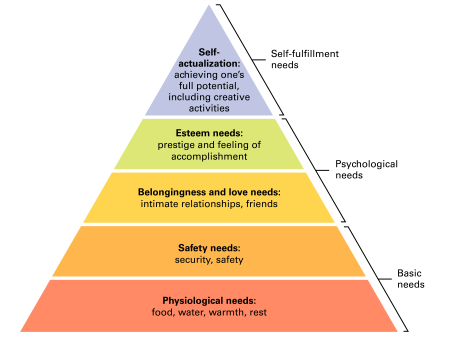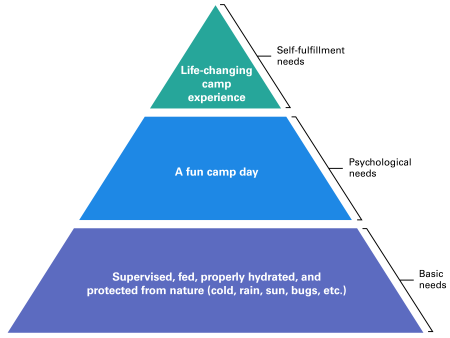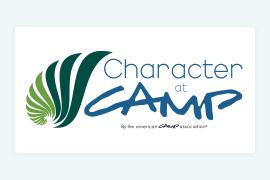This past July, I had an inspiring conversation with Buggi, an assistant director at Liberty Lake Day Camp. Buggi and I have often talked about leadership development, performance management, and camp culture. In this particular discussion, which lasted for close to an hour, he relayed how he was implementing supervision feedback through mentorship while I nodded feverishly and pumped my fist in the air. I couldn’t have agreed more with his practice.
The conversation “CliffsNotes”: his staff were performing well with immediate feedback through a mentoring relationship. This mentorship continued throughout the summer and enabled camp staff to build a trusting relationship with the camp’s leaders. This positive feedback system was a cornerstone of the camp’s culture, reinforcing the importance of showing up with a top-tier performance every day.
“That’s it?”
The people we remember in life are those who took the time to get to know us. These same people are also the leaders whom folks perform best under.
For me, it was my third-grade teacher. School finally clicked because I had a personal connection with her.
It was my camp counselor when I was 14, who encouraged me to try new activities and gave me a sense of belonging.
It was my two high school history teachers. With their thoughtful feedback, I pushed myself to do better work.
It was my bosses during my first full-time job in digital advertising. I learned more working for them than I did pursuing my undergraduate degree at the same time.
And it was a group of camp professionals who took the time to mentor that enabled me to consider a career in this industry.
I would not have gotten to where I am today without all of these individuals investing in me.
I’m willing to bet that most everyone working full time in the camp industry has a similar story.
Yet, whenever I am asked to speak about staff performance management and creating a great camp culture, I often get a confused look when I say mentorship is the answer. The reply is usually, “That’s it?”
Yes, that is really it.
Why Do Camp Staff Respond to Mentorship?
As part of every camp training session I lead, whether it is about campers or staff, I reference psychologist Abraham Maslow. Maslow’s Hierarchy of Needs is a psychological theory that suggests human motivation is driven by a progression of needs. We start by meeting basic physiological necessities (food, shelter) and then advance through safety, social belonging, self-esteem, and self-actualization, in which individuals strive to achieve their full potential.
This nearly 100-year-old theory still resonates deeply with how camp operates. “The average child in our society generally prefers a safe, orderly, predictable, organized world, which [they] can count on” (Maslow, 1943; see Figure 1). When campers feel safe, they are able to have fun at camp, which can lead to a life-changing experience.
Figure 1. Maslow’s hierarchy of needs (McLeod, 2023)

When we look at camp staff performance management, it reflects the exact same principle (see Figure 2).
For instance, if our staff feel safe at work and their basic needs are met, we can then focus on building the confidence (psychological needs) they need to take initiative (self-fulfillment needs) in their roles (McLeod, 2023).
Figure 2. Staff training

When staff do not feel safe, they will never develop a sense of belonging. If they never feel a sense of belonging, they will lack the confidence to take initiative in their roles.
Staff need the feeling of someone in their corner rooting for them. Experiencing the adverse will not only affect their performance but their entire team as well. In a recent study titled Rudeness and Team Performance, the authors shared, “specifically, rudeness has been shown to trigger both the fight and flight response to threat, as well as the physiological stress response system” (Gale et al., 2024). For years reality TV has promoted tough bosses who even yell at times to motivate employees. This study shows that the opposite solicits the best team performance.
When examining what staff want today from their supervisors, they have unique needs. Harvard Business Review released a study comparing 2012 employees’ needs from their executives versus those employee needs expressed in 2022. The findings match what camp staff want today: supervisors who are present and practice “listen to learn” communication based in authenticity. They also want leaders who practice inclusiveness and show a respect for others (Cowen & Kavanagh, 2024). Simply put, camp staff won’t perform well for supervisors by whom they don’t feel seen.
How Does Mentorship Play into a Camp’s Culture?
Culture is the unwritten rules and shared beliefs that define how staff work every day in summer camp.
Language plays a significant role in shaping culture, because it serves as the vehicle through which belief systems are spread. As Amanda Montell notes in the book Cultish: The Language of Fanaticism, “Words are the medium through which belief systems are manufactured, nurtured, and reinforced; their fanaticism fundamentally could not exist without them” (2021). This concept reinforces how sometimes people will joke about summer camp resembling a cult.
The essence of camp culture can be captured simply with this example: imagine you are running a day camp. Every morning you have a meeting to go over the day’s schedule before the campers arrive. One morning you must leave the meeting early to speak with a camp family. What do your camp staff say to one another when you are not in the room? Their conversation reflects your camp’s true culture.
If the staff feel safe and supported, they will likely take the initiative to finish the meeting and get ready for the day. Mentorship is a form of support.
How to Enact Mentorship at Camp
Camp leadership teams often have busy days, and mentorship takes time, but we need to prioritize building other great leaders and preparing the next generation. The defining line between good and great summer camps is the generation of leadership coming up the pipeline. Great summer camps have a deep bench of all-stars ready to move up into a new role. These all-stars are developed through mentorship. Yet, sadly, when I survey staff from summer camps, they will too often say, “I never got any feedback.”
The following steps outline how mentorship can be turned into a cornerstone of a camp culture and contribute to sound leadership development.
Step One: Be “a Good Hang”
Be present during camp activities, and staff will feel more connected to the leadership team every day. It takes consistency and intentionality, but as a result of this connection, staff will likely be more open to receiving feedback. This matters even when a member of leadership isn’t a staff person’s direct mentor. Leadership being “a good hang” will help avoid the “us versus them” mindset that can so easily develop between camp leadership and frontline staff.
Step Two: Choose Your Communication Delivery System
Pick a communication delivery system that works for your camp’s distinct culture — ideally a combination of both daily and weekly messaging.
Possible daily delivery systems:
- Morning Briefings
- What to do: start each day with a short, focused meeting (5–15 minutes) where you outline the day’s schedule, priorities, and any specific expectations.
- How to do it: gather the staff in a central location. Highlight key tasks, any special moments in the schedule, or changes. Set clear objectives for the day.
- Daily Check-ins
- What to do: conduct quick one-on-one or small group check-ins during breaks or in between activities.
- How to do it: ask about progress, challenges, and how they are feeling. Provide immediate feedback, encouragement, or guidance. Keep it brief (5–10 minutes) and positive.
- End-of-Day Debrief
- What to do: hold a short debrief at the end of each day to review how things went and address any issues.
- How to do it: gather the team in the late afternoon or evening. Discuss what went well, what did not, and what can be improved tomorrow. Recognize any outstanding efforts.
Possible weekly delivery systems:
- Weekly Planning Meeting
- What to do: set aside time at the start of each week to plan the upcoming week’s goals, events, and expectations.
- How to do it: meet with the entire staff, or smaller teams, at the beginning of the week. Review how camp ran last week, set goals for the coming week, and clarify roles for specific activities.
- Midweek Checkpoint
- What to do: schedule a mid-week checkpoint to assess progress toward weekly goals.
- How to do it: hold a 20- to 30-minute midweek meeting. Discuss where the team is on their goals and any adjustments needed, and provide feedback on what is working or what needs improvement.
- One-on-One Feedback Sessions
- What to do: conduct brief, informal, one-on-one feedback sessions with staff members to discuss their performance and development.
- How to do it: schedule these sessions once a week. Keep them concise (20–30 minutes) and focus on specific feedback. Recognize achievements, address any challenges, and set short-term goals.
- Weekly Recap and Reflection
- What to do: end the week with a reflection session where the team can share their thoughts on the week’s successes and challenges.
- How to do it: at the end of the week gather the team for a relaxed meeting. Highlight the week’s achievements, discuss lessons learned, and prepare mentally for the next week.
Another delivery method that works in a camp setting, especially when a director is short on time, is peer mentorship.
- What to do: pair experienced staff with newer members, fostering mutual growth through regular check-ins, goal setting, and collaborative learning.
- How to do it: solicit experienced staff who want to be mentors. Provide supportive tools like training and guiding questions. Ask mentors to have concise (15–20 minutes) meetings with mentees. Ask mentors to report back any progress and concerns.
Step Three: Be Consistent
Turning mentorship into a cornerstone of your camp’s culture takes consistency.
Calling back to Maslow’s hierarchy of needs, knowing what to expect (consistency) is strongly linked to feeling safe. If there is consistency when mentorship happens, folks will take in feedback because they trust their mentor. Trust can only be built if a person’s needs are being met.
A key aspect of consistency is routine. When folks know a meeting is coming, there is less stress. When they know at a certain time and place they will be able to bring their questions and concerns to be heard, they take comfort.
Part of this consistency is in how camp leaders lead. Use positive framing and focus on growth in an encouraging tone.
The final component of consistency is documenting progress. Establishing clear goals at the beginning of the summer around how the staff want to grow this summer in their roles and responsibilities. Realistic goals are attainable when broken down into weekly or biweekly milestones to track progress.
What This Means for a Camp Program
The success of any camp hinges on the strength of its culture, which is shaped by the relationships between leadership and staff. By investing time in mentorship, camp leaders foster a supportive environment where staff feel seen, valued, and motivated to perform their best.
More than ever before, staff want to be led; they actively seek leadership and guidance. One of the camp industry’s signature aspects of being one of the largest employers of young adults is how well we develop leaders.
Implementing mentorship through consistent daily and weekly practices, being present, and maintaining clear communication ensures that this culture of growth is continuously reinforced.
The result is a camp where the staff, united by shared values and trust in their leaders, can provide an enriching and memorable experience for the campers as they also learn to lead themselves. Prioritizing mentorship is not just a strategy — it is the most obvious pathway to inspiring the best performance from camp staff.
References
Cowen, A., & Kavanagh, K. (2024, January). The new rules of executive presence. Harvard Business Review. hbr.org/2024/01/the-new-rules-of-executive-presence
Gale, J., Erez, A., Bamberger, P., Foulk, T., Cooper, B., Riskin, A., Schilpzand, P., & Vashdi, D. (2024). Rudeness and team performance: Adverse effects via member social value orientation and coordinative team processes. Journal of Applied Psychology. Advance online publication. doi.org/10.1037/apl0001213
Maslow, A. H. (1943). A theory of human motivation. Psychological Review, 50(4), 370–396. doi.org/10.1037/h0054346
McLeod, S. (2023). Maslow’s hierarchy of needs. Simply Psychology. simplypsychology.org/maslow.html
Montell, A. (2021). Cultish: The Language of Fanaticism. New York, NY: Harper Wave, an imprint of HarperCollins Publishers.
Dan Weir is obsessed with leaders’ influence at summer camps. He is the senior consultant for Immersive1st as well as a former camp director and proud camper parent. Dan is also the cofounder of Day Camp Community, a support structure for YMCA Day Camps (daycampcommunity.com). He holds a master’s degree specializing in youth development. He can be reached at [email protected] or via the web at immersive1st.com.




